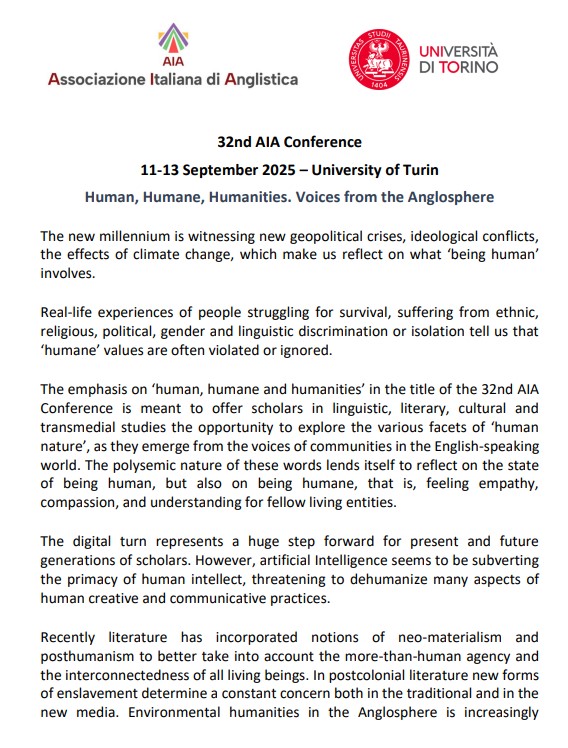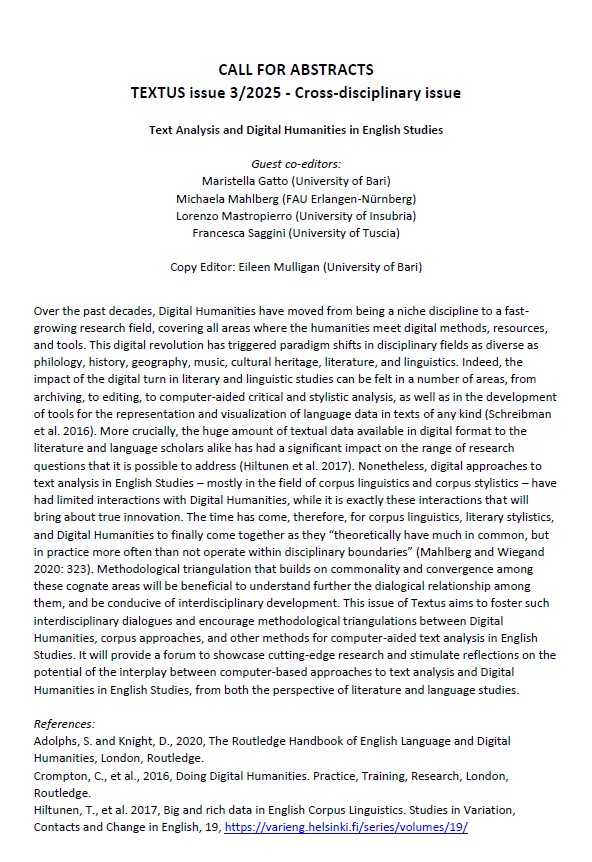*** 32nd AIA Conference *** 32nd AIA Conference – 11-13 September 2025 – University of Turin – “Human, Humane, Humanities. Voices from the Anglosphere”
11-13 September 2025 – University of Turin Human, Humane, Humanities. Voices from the Anglosphere 32nd AIA Conference 11-13 September 2025 – University of Turin Human, Humane, Humanities. Voices from the Anglosphere The new millennium is witnessing new geopolitical crises, ideological conflicts, the effects of climate change, which make us reflect on what ‘being human’ involves. Real-life experiences of people struggling for survival, suffering from ethnic, religious, political, gender and linguistic discrimination or isolation tell us that ‘humane’ values are often violated or ignored. The emphasis on ‘human, humane and humanities’ in the title of the 32nd AIA Conference is meant to offer scholars in linguistic, literary, cultural and transmedial studies the opportunity to explore the various facets of ‘human nature’, as they emerge from the voices of communities in the English-speaking world. The polysemic nature of these words lends itself to reflect on the state of being human, but also on being humane, that is, feeling empathy, compassion, and understanding for fellow living entities. The digital turn represents a huge step forward for present and future generations of scholars. However, artificial Intelligence seems to be subverting the primacy of human intellect, threatening to dehumanize many aspects of human creative and communicative practices. Recently literature has incorporated notions of neo-materialism and posthumanism to better take into account the more-than-human agency and the interconnectedness of all living beings. In postcolonial literature new forms of enslavement determine a constant concern both in the traditional and in the new media. Environmental humanities in the Anglosphere is increasingly engaged in interconnected issues of social and climate justice, asymmetrical power relations and decolonial thinking. AIA members are invited to submit proposals for Seminars relevant to the following themes, from the perspective of literary, linguistic and cultural studies. Inter- or cross-disciplinary Seminars, addressing issues from multiple perspectives, are strongly encouraged. AIA32 will host the following plenary speakers: Rossella Ciocca, University of Naples “L’Orientale” Radhika Jha, cosmopolitan author Carol O’Sullivan, University of Bristol, United KingdomMichele Zappavigna, University of New South Wales, Australia Call for Seminars AIA members are invited to submit proposals (max 300 words, including references). Proposals can be jointly submitted to the Scientific Committee by a minimum of two or a maximum of three convenors from different universities. Please send your proposals to aia32@unito.it by 1 February 2025. Notification of acceptance: 15 March 2025. The full list of Seminars with outlines and contact addresses of convenors will be published on the conference website by 15 March 2025. Call for Papers AIA members are invited to submit abstracts of individual papers for specific Seminars only from 15 March 2025 when the list of Seminars will be made available. Deadline for submission of abstracts for individual papers: 15 April 2025. Abstracts (WORD format) should be about 300 words long, including references. Font: Times New Roman, 12 points. Notification of acceptance: 15 May 2025. Please note that:– Seminars must include either 4, 5 or 8 speakers (each speaker will be allowed 20 minutes for presentation and 10 minutes for Q&A);– AIA members may present only one paper (this applies both to single-author and co-authored presentations).Please send your proposals to aia32@unito.it Link to AIA32 website: https://corep.it/aia-conference-2025 Organizing Committee Esterino Adami, Harjot Banga, Cecilia Boggio, Maria Cristina Caimotto, Stefania Cicillini, Carmen Concilio, Michelangelo Conoscenti, Irene De Angelis, Massimiliano Demata, Paola Della Valle, Maria Laura Ferroglio, Maria Festa, Antonella Maria Giacosa, Alessio Mattana, Vincenza Minutella, Alessandra Molino, Costanza Mondo, Ilaria Parini, Teresa Prudente, Silvia Pireddu, Virginia Pulcini, Giorgia Riboni, Marco Santello, Karolina Anna Tatar, Nesrine Triki, Virginia Zorzi, Angela Zottola. Scientific Committee Esterino Adami (Università di Torino) Giuseppe Balirano (Università di Napoli “L’Orientale”) Roberto Baronti Marchiò (Università di Cassino e del Lazio Meridionale) Cecilia Boggio (Università di Torino) Paola Brusasco (Università di Chieti) Claudia Cao (Università di Cagliari) Valentina Castagna (Università di Palermo) Paola Catenaccio (Università di Milano) Carmen Concilio (Università di Torino) Michelangelo Conoscenti (Università di Torino) Giuseppina Cortese (Università di Torino) Manuela D’Amore (Università di Catania) Irene De Angelis (Università di Torino) Bianca Del Villano (Università di Napoli “L’Orientale”) Paola Della Valle (Università di Torino) Massimiliano Demata (Università di Torino) Elena Di Giovanni (Università di Macerata) Eleonora Federici (Università di Ferrara) Cristiano Furiassi (Università di Torino) Francesca Guidotti (Università di Bergamo) Siria Guzzo (Università di Salerno) Bronwen Hughes (Università di Napoli Parthenope) C. Bruna Mancini (Università della Calabria) Pierpaolo Martino (Università di Bari) Vincenza Minutella (Università di Torino) Alessandra Molino (Università di Torino) Marilena Parlati (Università di Padova) Donatella Pallotti (Università di Firenze) Silvia Pireddu (Università di Torino) Virginia Pulcini (Università di Torino) Irene Ranzato (Sapienza Università di Roma) Enrico Reggiani (Università Cattolica del Sacro Cuore) Giorgia Riboni (Università di Torino) Federico Sabatini (Università di Torino) Rossana Maria Sebellin (Università di Roma Tor Vergata) Maria Grazia Sindoni (Università di Messina) Elena Spandri (Università di Siena) Massimo Sturiale (Università di Milano) Laura Tosi (Università Ca’ Foscari Venezia) Angela Zottola (Università di Torino)



